Pathophysiology uc week 1 - Study guides, Class notes & Summaries
Looking for the best study guides, study notes and summaries about Pathophysiology uc week 1? On this page you'll find 38 study documents about Pathophysiology uc week 1.
Page 3 out of 38 results
Sort by
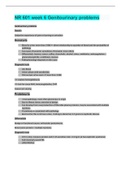
-
NR 601 week 6 Genitourinary problems
- Other • 12 pages • 2022
-
- $13.99
- + learn more
NR 601 week 6 Genitourinary problems Genitourinary problems Dysuria Subjective experience of pain or burning on urination Hematuria - Blood in urine; more than 3 RBC=> direct relationship to quantity of blood and the probability of pathology - Two types (Transient: sometimes, Persistent: more often) - Differentials: trauma, cancer, coffee, chocoholic, alcohol, citrus, antibiotics, anticoagulation, - glomerulonephritis, urolithiasis, menses - Pathophysiology-depends on the cause Dia...
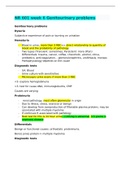
-
NR 601 week 6 Genitourinary problems
- Other • 16 pages • 2022
-
- $13.99
- + learn more
NR 601 week 6 Genitourinary problems Genitourinary problems Dysuria Subjective experience of pain or burning on urination Hematuria - Blood in urine; more than 3 RBC=> direct relationship to quantity of blood and the probability of pathology - Two types (Transient: sometimes, Persistent: more often) - Differentials: trauma, cancer, coffee, chocoholic, alcohol, citrus, antibiotics, anticoagulation, - glomerulonephritis, urolithiasis, menses - Pathophysiology-depends on the cause Dia...
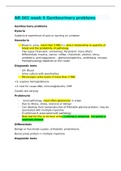
-
NR 601 week 6 Genitourinary problems
- Other • 16 pages • 2022
-
- $13.99
- + learn more
NR 601 week 6 Genitourinary problems Genitourinary problems Dysuria Subjective experience of pain or burning on urination Hematuria - Blood in urine; more than 3 RBC=> direct relationship to quantity of blood and the probability of pathology - Two types (Transient: sometimes, Persistent: more often) - Differentials: trauma, cancer, coffee, chocoholic, alcohol, citrus, antibiotics, anticoagulation, - glomerulonephritis, urolithiasis, menses - Pathophysiology-depends on the cause Dia...
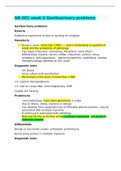
-
NR 601 week 6 Genitourinary problems
- Other • 16 pages • 2022
-
- $13.99
- + learn more
NR 601 week 6 Genitourinary problems Genitourinary problems Dysuria Subjective experience of pain or burning on urination Hematuria - Blood in urine; more than 3 RBC=> direct relationship to quantity of blood and the probability of pathology - Two types (Transient: sometimes, Persistent: more often) - Differentials: trauma, cancer, coffee, chocoholic, alcohol, citrus, antibiotics, anticoagulation, - glomerulonephritis, urolithiasis, menses - Pathophysiology-depends on the cause Dia...
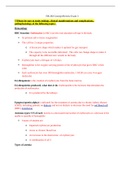
-
NR 283 Concept Review Exam 3 patho (Best for Revision)
- Other • 41 pages • 2022
-
- $10.99
- + learn more
NR 283 Concept Review Exam 3 **Please be sure to study etiology, clinical manifestations and complications, pathophysiology of the following topics: Hematology RBC-function- Erythrocytes (or RBC’ s) are the most abundant cell type in the body • Its primary job is tissue oxygenation • The cell has 2 unique properties: o A biconcave shape which makes it optimal for gas transport o The capacity to be reversible deformed. The cells can change shape to make it through all the different size ves...
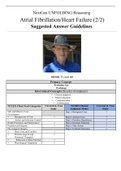
-
NextGen UNFOLDING Reasoning Atrial Fibrillation/Heart Failure (2/2) Suggested Answer Guidelines
- Exam (elaborations) • 20 pages • 2022
-
- $15.49
- + learn more
NextGen UNFOLDING Reasoning Atrial Fibrillation/Heart Failure (2/2) Suggested Answer Guidelines Bill Hill, 71 years old Primary Concept Perfusion Gas Exchange Interrelated Concepts (In order of emphasis) • Clinical judgment • Patient education • Communication • Collaboration NCLEX Client Need Categories Covered in Case Study NCSBN Clinical Judgment Model Covered in Case Study Safe and Effective Care Environment Step 1: Recognize Cues • Management of Care Step 2:...
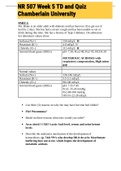
-
Exam (elaborations) NR 507 Week 5 TD And Quiz Chamberlain University
- Exam (elaborations) • 16 pages • 2022
-
- $7.49
- + learn more
Exam (elaborations) NR 507 Week 5 TD And Quiz Chamberlain University PART 1: Ms. Blake is an older adult with diabetes and has been too ill to get out of bed for 2 days. She has had a severe cough and has been unable to eat or drink during this time. She has a history of Type I diabetes. On admission her laboratory values show: Sodium (Na+) 156 mEq/L H Potassium (K+) 4.0 mEq/L N Chloride (Cl–) 115 mEq/L H Arterial blood gases (ABGs) pH- 7.30; Pco2-40; Po2-70; HCO3-20 METABOLIC AC...
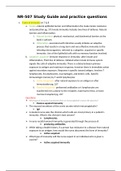
-
NR-507 Study Guide and practice questions
- Exam (elaborations) • 60 pages • 2021
-
- $22.99
- + learn more
NR-507 Study Guide and practice questions 1. Types of immunity ch 7 & 8 a. Innate- natural epithelial barrier and inflammation the make innate resistance and protection pg. 191 Innate immunity includes two lines of defense: Natural barriers and inflammation. i. Natural barriers- physical, mechanical, and biochemical barriers at the body’s surfaces ii. Inflamation- associated with infection usually initiates an adaptive process that results in a long-term and very effective immunity to the...
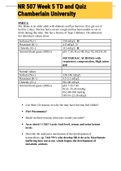
-
NR 507 Week 5 TD and Quiz Chamberlain University (NR507)
- Exam (elaborations) • 16 pages • 2021
-
- $8.99
- + learn more
Exam (elaborations) NR 507 Week 5 TD and Quiz Chamberlain University (NR507) PART 1: Ms. Blake is an older adult with diabetes and has been too ill to get out of bed for 2 days. She has had a severe cough and has been unable to eat or drink during this time. She has a history of Type I diabetes. On admission her laboratory values show: Sodium (Na+) 156 mEq/L H Potassium (K+) 4.0 mEq/L N Chloride (Cl–) 115 mEq/L H Arterial blood gases (ABGs) pH- 7.30; Pco2-40; Po2-70; HCO3-20 METABOL...
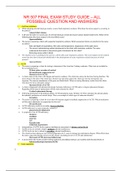
-
NR 507 FINAL EXAM STUDY GUIDE – ALL POSSIBLE QUESTION AND ANSWERS
- Summary • 28 pages • 2021
-
- $16.49
- + learn more
NR 507 Final Exam Study Guide 28 PAGES ACID BASE IMBALANCE While checking arterial blood gas results, a nurse finds respiratory acidosis. What does the nurse suspect is occurring in the patient? A 20-year-old male is in acute pain. An arterial blood gas reveals decreased carbon dioxide (CO2 ) levels. Which of the following does the nurse suspect is the most likely cause? The nurse is assessing a client with suspected respiratory acidosis. Which assessment items are priority for the nurse ...

Study stress? For sellers on Stuvia, these are actually golden times. KA-CHING! Earn from your study resources too and start uploading now. Discover all about earning on Stuvia


